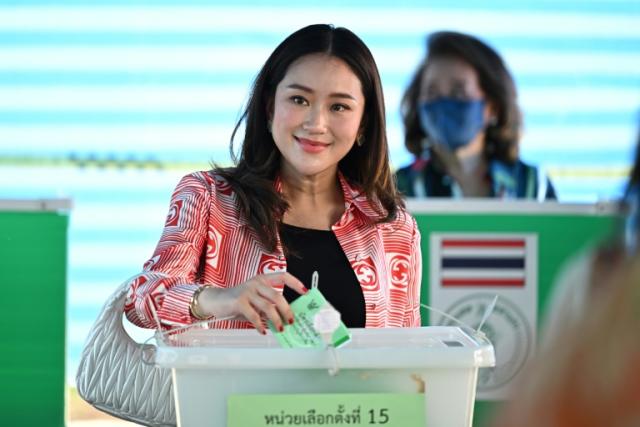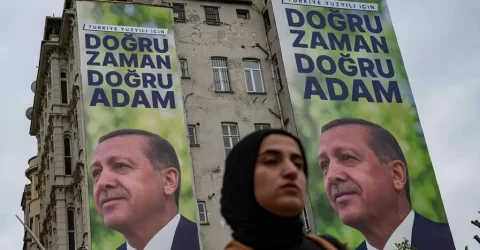
Vote counting got under way in Thailand’s general election Sunday with pro-democracy opposition parties tipped to
defeat the conservative military-backed government of Prime Minister Prayut
Chan-O-Cha after almost a decade in power.
Opinion surveys pointed to a resounding defeat for ex-army chief and coup
leader Prayut after a campaign that played out as a clash between a young
generation yearning for change and the traditionalist, royalist
establishment.
The main opposition Pheu Thai party, fronted by the daughter of billionaire
former premier Thaksin Shinawatra, was ahead in final opinion polls.
But in a kingdom where victory at the ballot box has often been trumped by
coups and court orders, there are fears the military could seek to cling on,
raising the prospect of fresh instability.
Polling stations closed at 5:00 pm (1000 GMT) after a smooth day of voting,
with no major problems reported by Thai media.
Preliminary results are expected later in the evening, though the final
number of seats won by each party will not be officially confirmed for
several weeks.
After casting her ballot in Bangkok, Pheu Thai’s main candidate Paetongtarn
Shinawatra showed no signs of nerves.
“Today is going to be a good day. I have very positive energy about it,” the
36-year-old told reporters, smiling broadly.
Millions of Thais cast ballots at 95,000 polling stations scattered from the
lush-forested mountains of the north to the idyllic sands of the southern
beaches.
A turnout of 90 percent in last Sunday’s early round of voting pointed to an
electorate looking for change, but the opposition faces an uphill battle to
secure power, thanks to the junta-scripted 2017 constitution.
The new premier will be chosen jointly by the 500 elected MPs and 250 senate
members appointed by Prayut’s junta — stacking the deck in the army’s
favour.
In the controversial last election in 2019, Prayut rode senate support to
become prime minister at the head of a complex multi-party coalition.
– Protest legacy –
The election is the first since major youth-led pro-democracy protests
erupted across Bangkok in 2020 with demands to curb the power and spending of
Thailand’s king — breaching a long-held taboo on questioning the monarchy.
The demonstrations petered out as Covid-19 curbs were imposed and dozens of
leaders were arrested, but their energy has fuelled growing support for the
more radical opposition Move Forward Party (MFP).
MORE/SSS/1625 hrs
As he arrived to vote in Bangkok, MFP leader Pita Limjaroenrat, 42, said he
expected a “historic turnout”.
“Younger generations these days care about their rights and they will come
out to vote,” he told reporters.
While MFP is looking for support from millennial and Gen Z voters — who make
up nearly half the 52 million-strong electorate — Pheu Thai’s base is in the
rural northeast where voters are still grateful for the welfare policies
implemented by Thaksin in the early 2000s.
Prayut also urged voters to turn out in large numbers as he cast his ballot
on Sunday.
The former general has made an unashamedly nationalist pitch to older voters,
painting himself as the only candidate capable of saving Thailand from chaos
and ruin.
But he has lagged badly in the polls, blamed for a sputtering economy and
feeble recovery from the pandemic, which battered the kingdom’s crucial
tourism industry.
Voter Pakorn Adulpan, 85, said he was impressed by the quality of this year’s
contest.
“I am very hopeful because there is strong competition between many talented
candidates, compared to the elections in the past,” he told AFP.
Rights groups accuse Prayut of overseeing a major crackdown on basic
freedoms, with a huge spike in prosecutions under Thailand’s draconian royal
defamation laws.
The country has seen a dozen coups in the last century and has been locked
over the last two decades in a rolling cycle of street protests, coups and
court orders dissolving political parties.
The Shinawatra family’s bitter tussle with the royalist-military
establishment has been at the heart of the drama, with Thaksin ousted in a
2006 coup and his sister Yingluck unseated by Prayut in 2014.
An unclear or disputed result this time could lead to a fresh round of
demonstrations and instability.
Adding to the uncertainty, rumours are already swirling that MFP could be
dissolved by court order — the same fate that befell its predecessor Future
Forward Party after it performed unexpectedly well at the 2019 poll.
Once results come in, attention will turn to the Electoral Commission, the
judges and the generals to see what the next steps will be.




